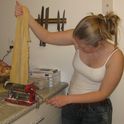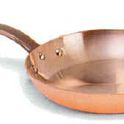How do you shop and cook for two people and it not cost a fortune? I love trying out recipes, but I just dont have the money it seems to cost.
24 Comments
SamlawaliJune 2, 2014
Thanks to all for your wonderful responses. What a great forum!
LucySJune 2, 2014
I think people have hinted at this, but a really small thing with a big impact that we started doing recently (also a household of two) was just planning ahead. It's made an enormous difference - I always used to end up throwing out things I didn't get around to cooking, or finding ourselves with nothing to eat and ordering takeout (also expensive). Every weekend, we plan out exactly what we're going to cook every night that week, write it down on the fridge, and make a grocery list before getting everything we'll need. It has cut down hugely on waste and takeout nights.
JulieJune 2, 2014
Last year I invested in a small deep freezer, and it's been fantastic for saving leftover ingredients and meals. For me, the hardest part of cooking for two is using up fresh ingredients before they go bad - with the freezer I can use what I need and freeze the rest for later in standard portions (labeled and dated). It really cuts down on waste, and it's convenient to have a stash of ingredients and meals in the freezer. Mine is full to the brim now and I have no idea how I lived with my tiny refrigerator freezer for so long!
MaedlJune 2, 2014
If you make stews and soups, you can freeze portions for meals when you don't have time to cook.
I try to buy unpackaged items--I can pick out the freshest produce that will last a bit longer, plus I get the quantity I want, not the quantity the store wants to get rid of.
Go to the library and look through the cookbooks for recipe ideas. .there are many books aimed at cooking for two and those should help you plan better.
I try to buy unpackaged items--I can pick out the freshest produce that will last a bit longer, plus I get the quantity I want, not the quantity the store wants to get rid of.
Go to the library and look through the cookbooks for recipe ideas. .there are many books aimed at cooking for two and those should help you plan better.
Kristen W.June 2, 2014
I think these are all fantastic suggestions! To them, I would add that getting a small weekly farm box has lowered my weekly grocery bill significantly. Although the cost of the box is reasonable, that is not the reason for the savings; rather, it is because the farm box has totally changed the way I cook. My meals are now ingredient-driven, rather than recipe-driven, and those ingredients driving the cooking now tend to be produce, as opposed to meat. Cooking from the box (and, let's be honest, watching A LOT of Chopped episodes) has taught me to be much bolder with making substitutions in familiar recipes, so that I can use what I've got for the week, no more, no less. I do supplement with produce from the grocery store when necessary, but pretty minimally. I believe that being able to improvise (along with having a well-stocked pantry) goes a long way towards saving money on groceries. If I don't have the time or inclination to go to the market on a day when the refrigerator is looking depleted, I can almost always put something dinner-worthy together from whatever I've got in the house. Over time, this saves quite a bit of money.
M.McAwesomeJune 3, 2014
Having my CSA box has made the biggest difference in my cooking! I get a box with only veggies as we never go through all of the fruit. The most important thing it has taught me is to plan our meals. I actually get a big box of veggies for just 2 people but everything is so fresh. Some things have to be used first because they wilt pretty quickly. Keeping that in mind really makes me plan ahead. I usually make enough for dinner and leftovers to have for lunch.
When it gets down to the wire though I just chop everything up and make a giant veggie stir fry. Making a sauce with whatever I have, sometimes just soy sauce and siracha. Put this over some brown rice. And you have a very good meal. Want extra protein? Add a hard boiled egg.
My other go to is soup. It is easy to take a recipe and stretch it by adding extras of the cheaper ingredients like rice or beans or quinoa.
When it gets down to the wire though I just chop everything up and make a giant veggie stir fry. Making a sauce with whatever I have, sometimes just soy sauce and siracha. Put this over some brown rice. And you have a very good meal. Want extra protein? Add a hard boiled egg.
My other go to is soup. It is easy to take a recipe and stretch it by adding extras of the cheaper ingredients like rice or beans or quinoa.
Monique R.June 1, 2014
I suggest using a sale app like Favado. You can pick the stores your prefer to shop in your area. You can save the items you're interested in and shop from the list, which saves money AND time (no mailer browsing or isle wandering). Also, get comfortable with the idea of making enough to have for lunch the next day and to freeze for a meal (and lunch if you'd like) for the following week. By the end of the week you've got all of you're meals for the following week already prepped.
Jan W.June 1, 2014
Here are a few strategies I use for saving money when trying new recipes/cuisines, especially when those recipes call for ingredients that you don't typically use:
Buy from bulk containers - Spices are probably the most expensive thing per unit weight, and if you go to a health food store or a specialty spice retailer, you can typically buy small amounts from bulk, which means typically less than $1.00 per spice rather than the $5+ for jars in the supermarket. Rice, grains, nuts, seeds, beans and other legumes can also be bought from bulk. Also, if you have the fortune to have any ethnic groceries in your area, buy dry items from them because they're typically far cheaper than a mainstream supermarket for the same items. That goes for exotic fresh produce as well (I'm looking at you Melissa's).
Buy/borrow a home vacuum sealer - I have a Freshsaver compact unit that I picked up two years ago, and it really is a boon in the kitchen. You can buy larger quantities of fresh meat, fish, and poultry, seal it up in a vacuum bag and freeze. The meat will thaw beautifully with no degrading of texture or flavor. Works great for seafood too. You can also use it to seal up grains like rice, quinoa and polenta. It is especially nice for keeping your roasted coffee from getting stale, and the bags reseal quite easily. You can also seal up sauces, broths, and stocks in them and freeze for later.
Borrow ingredients from a foodie friend - Chances are, a foodie friend of yours also has ingredients that he or she couldn't possibly use up (tamarind paste, anyone?). So why not ask to borrow a few bits? I'm not telling you to ask to raid their pantry, but sometimes people just happen to have stuff around that you never thought they would. Maybe even do an even trade! Fun times. This also goes for crockery - why buy a baking pan or a springform pan when your cheesecake-loving friend has four of them?
Treat your cheese well - there's not really too much you can do about cheese, it's just an expensive item. However, you can keep most varieties of semi-firm and firm cheeses for quite a long time using parchment or wax paper. For your hard grating cheeses, once again vacuum-packing really does allow them to remain good for several months rather than a few weeks.
Buy from bulk containers - Spices are probably the most expensive thing per unit weight, and if you go to a health food store or a specialty spice retailer, you can typically buy small amounts from bulk, which means typically less than $1.00 per spice rather than the $5+ for jars in the supermarket. Rice, grains, nuts, seeds, beans and other legumes can also be bought from bulk. Also, if you have the fortune to have any ethnic groceries in your area, buy dry items from them because they're typically far cheaper than a mainstream supermarket for the same items. That goes for exotic fresh produce as well (I'm looking at you Melissa's).
Buy/borrow a home vacuum sealer - I have a Freshsaver compact unit that I picked up two years ago, and it really is a boon in the kitchen. You can buy larger quantities of fresh meat, fish, and poultry, seal it up in a vacuum bag and freeze. The meat will thaw beautifully with no degrading of texture or flavor. Works great for seafood too. You can also use it to seal up grains like rice, quinoa and polenta. It is especially nice for keeping your roasted coffee from getting stale, and the bags reseal quite easily. You can also seal up sauces, broths, and stocks in them and freeze for later.
Borrow ingredients from a foodie friend - Chances are, a foodie friend of yours also has ingredients that he or she couldn't possibly use up (tamarind paste, anyone?). So why not ask to borrow a few bits? I'm not telling you to ask to raid their pantry, but sometimes people just happen to have stuff around that you never thought they would. Maybe even do an even trade! Fun times. This also goes for crockery - why buy a baking pan or a springform pan when your cheesecake-loving friend has four of them?
Treat your cheese well - there's not really too much you can do about cheese, it's just an expensive item. However, you can keep most varieties of semi-firm and firm cheeses for quite a long time using parchment or wax paper. For your hard grating cheeses, once again vacuum-packing really does allow them to remain good for several months rather than a few weeks.
PegeenJune 1, 2014
Great tips here! I have to agree with CookinginVictoria that it helps organize your pantry and menus so you don't purchase things you already have, etc. Thrifty cooking is also a great way to learn about substitutions... using items you already have in place of those you don't. Doing some recipe searches by ingredient you want to use up is a good way to get ideas when you can't stand one more salad. :-)
bigpanJune 1, 2014
I would invest in a vacuum packer. Buy large quantities of meats on sale or at Costco and then vacuum repack into servings of two and freeze. They will keep for a year when vacuum packed. As an example, I buy a couple chicken thighs at Safeway for about $4. At Costco I buy a box of 24 for about $18, repack in 2's for a cost of about 75 cents instead of $4 !
You can blanch and freeze fresh veg in the summer, make a large quantity of stock and freeze in icecube trays, then repack in the vacuum bags.
The cost of the vacuum packer pays for itself within a few months and you are on the road to savings savings savings.
You can blanch and freeze fresh veg in the summer, make a large quantity of stock and freeze in icecube trays, then repack in the vacuum bags.
The cost of the vacuum packer pays for itself within a few months and you are on the road to savings savings savings.
bigpanJune 1, 2014
I would invest in a vacuum packer. Buy large quantities of meats on sale or at Costco and then vacuum repack into servings of two and freeze. They will keep for a year when vacuum packed. As an example, I buy a couple chicken thighs at Safeway for about $4. At Costco I buy a box of 24 for about $18, repack in 2's for a cost of about 75 cents instead of $4 !
You can blanch and freeze fresh veg in the summer, make a large quantity of stock and freeze in icecube trays, then repack in the vacuum bags.
The cost of the vacuum packer pays for itself within a few months and you are on the road to savings savings savings.
You can blanch and freeze fresh veg in the summer, make a large quantity of stock and freeze in icecube trays, then repack in the vacuum bags.
The cost of the vacuum packer pays for itself within a few months and you are on the road to savings savings savings.
inpatskitchenMay 31, 2014
All the answers here are great! I incorporate beans and seasonal vegetables into our menus, shop sales and stock up on meats when they are on sale. I'll make a bean chili one night so that the next I don't feel as guilty when I splurge on a great piece of fish or a prime cut of beef. A splurge once a week is good for the body and soul!
Sam1148May 31, 2014
Another hint is to do a salad bar thing. Quite a few upscale stores have a salad bar and things are purchased by weight.
Load up on lightweight stuff...spinach. kale, other good greens...mushrooms.
No dressing or heavy stuff. The weight of those dry things is far cheaper than bagged item---which often go bad when you're not feeding 4 people.
The "Salad bar" trick is great for having fresh veggies in small portions for 2 people. Just don't put weighty things like cucumbers and melons on it.
Load up on lightweight stuff...spinach. kale, other good greens...mushrooms.
No dressing or heavy stuff. The weight of those dry things is far cheaper than bagged item---which often go bad when you're not feeding 4 people.
The "Salad bar" trick is great for having fresh veggies in small portions for 2 people. Just don't put weighty things like cucumbers and melons on it.
cookinginvictoriaMay 31, 2014
My family is not vegetarian, but over the past few years we have really cut down on our consumption of chicken, pork and beef. We usually will feature a meal with animal protein just once or twice a week. Most of our meals consist of fresh fruit and vegetables, a fair amount of fish, various grains, eggs, and legumes. We evolved into this style of eating over time, and we now save a sizable amount of money on our grocery bills.
The other thing (easier said than done, I know!) is to try to be really, really organized in the kitchen. Plan your meals a week or even a month in advance. Try to waste as little food as possible. Use vegetable scraps and chicken or beef bones to make stock. Try not to buy more food than you know that you will eat. Keep an inventory of your refrigerator and freezer and pantry so that you only purchase what you are running low on or what is planned for that week or month's menu.
The other thing (easier said than done, I know!) is to try to be really, really organized in the kitchen. Plan your meals a week or even a month in advance. Try to waste as little food as possible. Use vegetable scraps and chicken or beef bones to make stock. Try not to buy more food than you know that you will eat. Keep an inventory of your refrigerator and freezer and pantry so that you only purchase what you are running low on or what is planned for that week or month's menu.
boulangereMay 31, 2014
I shop and cook for one, and most of my recipes are scaled for two plus the heavenly bonus of leftovers which make divine lunches: http://thesolitarycook.wordpress.com
Sam1148May 30, 2014
First thing you need to get a spice pantry. Do NOT get spices from the supermarket. Give some local healthfood stores a call. Ask if they have bulk spices. Normally you have to weigh and bag them yourself.
I can replace the major spices I use for about 5 dollars twice a year.
Go in with a list..and have some old spice bottles ready or airtight containers ready for the new spice---tho I'm bad and keep some of them in bags because I use them quickly.
Shop at ethnic stores for things like Rice, lentils, some speciality spices, semolina flour and Bulgar wheat (at a middle eastern store), Soy sauce, fish sauce at Asian store.
The local "Big Lots" store often has a surprisingly good EV olive oil for very cheap..and other items you wouldn't expect to find shuffled down to super discount store.
I can replace the major spices I use for about 5 dollars twice a year.
Go in with a list..and have some old spice bottles ready or airtight containers ready for the new spice---tho I'm bad and keep some of them in bags because I use them quickly.
Shop at ethnic stores for things like Rice, lentils, some speciality spices, semolina flour and Bulgar wheat (at a middle eastern store), Soy sauce, fish sauce at Asian store.
The local "Big Lots" store often has a surprisingly good EV olive oil for very cheap..and other items you wouldn't expect to find shuffled down to super discount store.
Dave O.May 30, 2014
Join the military and go to the Comissary, haha. If you don't want to change your lives, my wife and I started a hanging herb garden on our back porch, with peppers also. We also hit up the farmers market, which has in season veggies on the cheap. Ours also has a Pork wholesaler with good priced pig. Also, this site has great recipes for flank and hangar steaks which are cheaper than other cuts. And the good ol pork shoulder is a huge cut of meat for little price, and can be used in a bunch of dishes. (See pulled pork, tacos, pho, etc.)
Flirty F.May 30, 2014
Beans! They are nourishous delicious and cheap! Tuscan white beans with rosemary. Caribbean rice and peas.... And while studying abroad in Spain I used to live on lentil soup. Tomatoes, onions, potatoes a little bacon. Made it every week!
aobenourMay 30, 2014
I have this same problem. I suggest sticking to one cuisine each week - a week of Thai, a week of Mexican, a week of Italian, etc. that way, when you buy speciality ingredients you're more likely to use then up and get your money's worth.
MonitaMay 30, 2014
Always buy produce that's in season. Buy larger quantities of shelf stable products that will keep, like rice and other grains. Also buy large size oils and vinegars and make your own salad dressings. If beef is on sale buy a large quantity; make chili or stew and freeze portions for later use. Experiment with soups; not expensive to cook.
Flirty F.May 30, 2014
I agree with almost everything Monita said. Only difference is that I don't buy large qualities of meat to freeze. Small freezer... I just go along with my favorite supermarkets weekly sales. Supermarkets change sale items every weeks so you have to eat the same thing over and over. And usually their is at least one type of each protein meat/poultry/seafood on sale.
Showing 24 out of 24 Comments
Recommended by Food52
Popular on Food52
Continue After Advertisement














